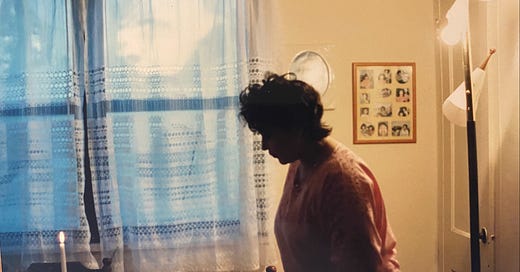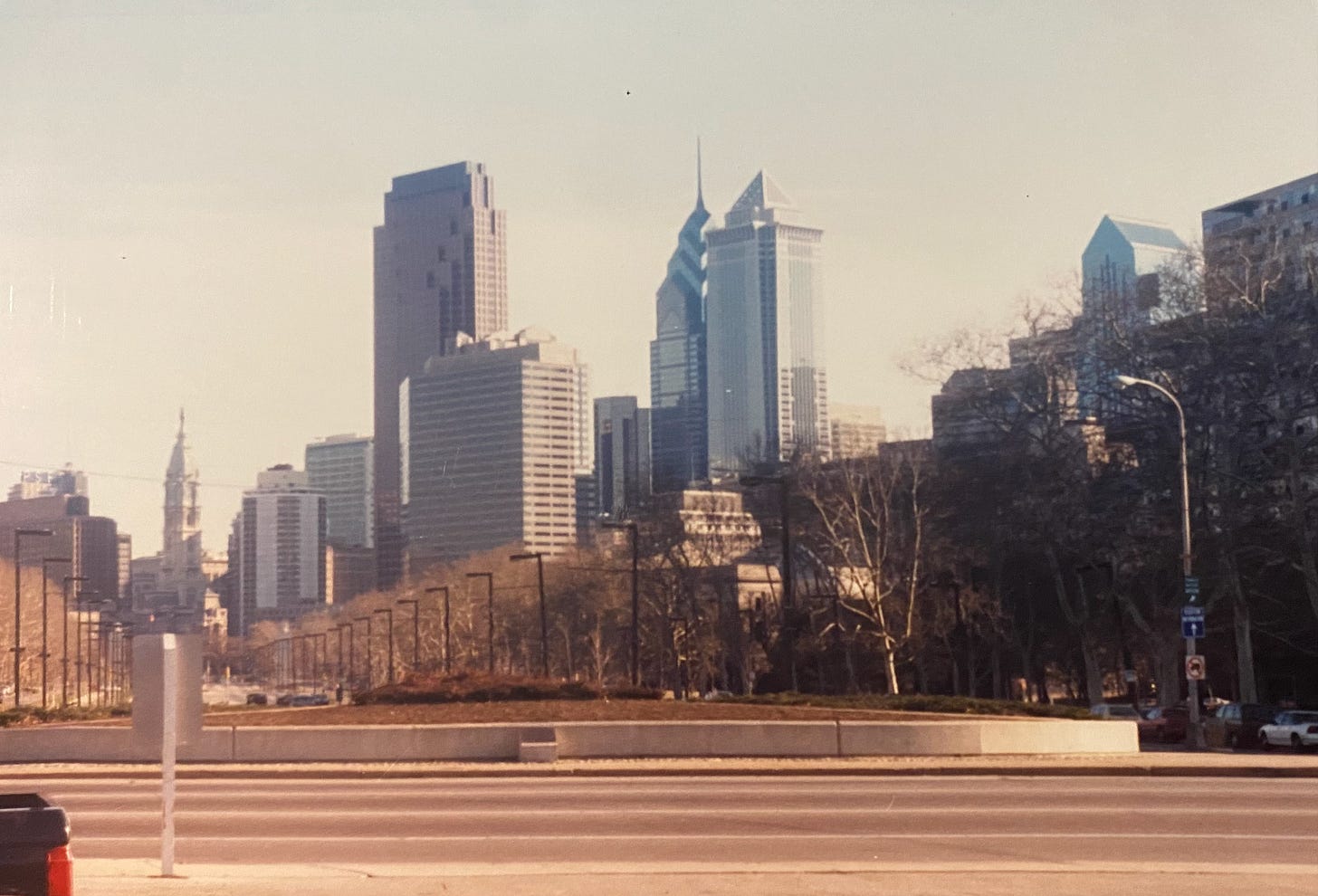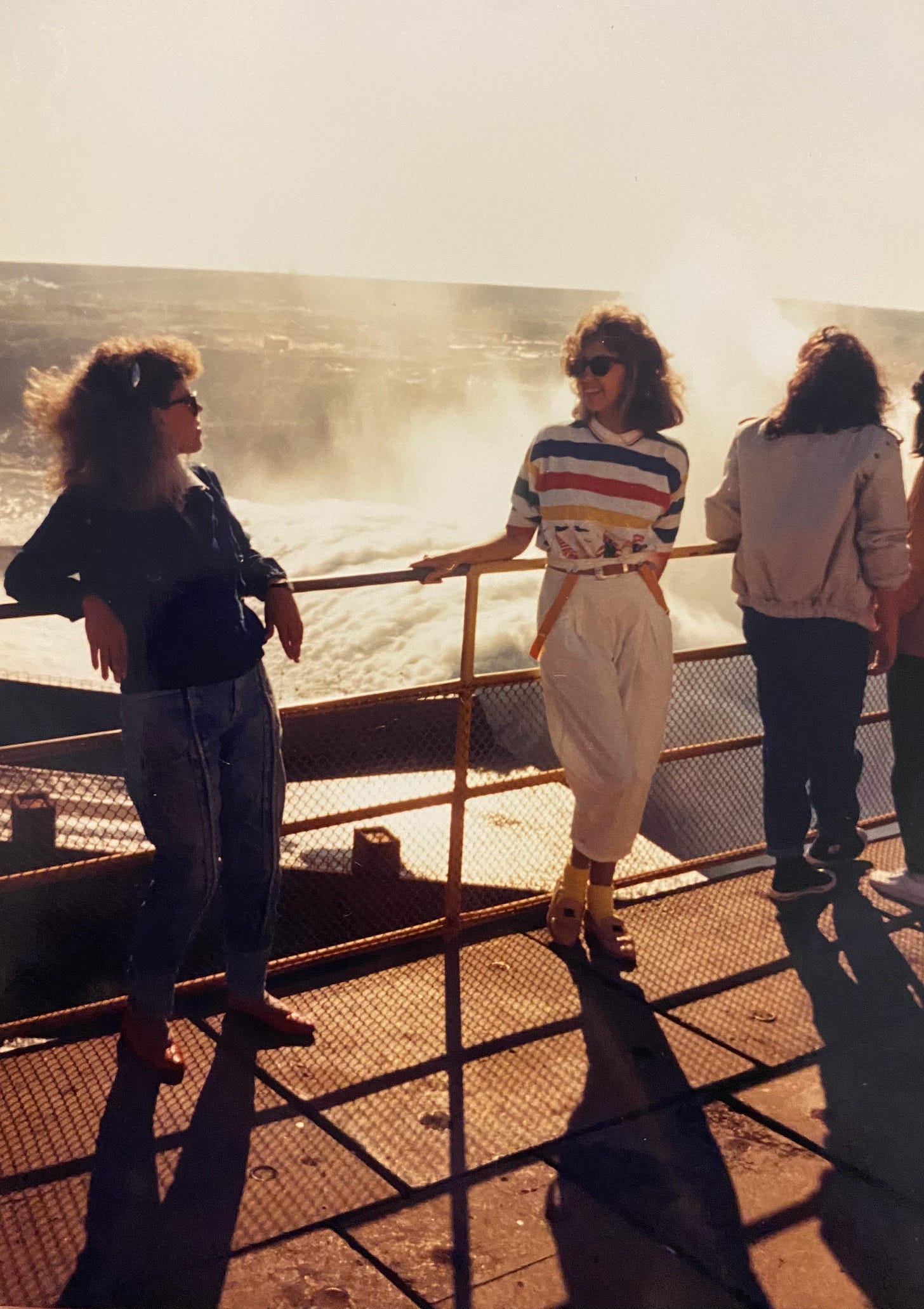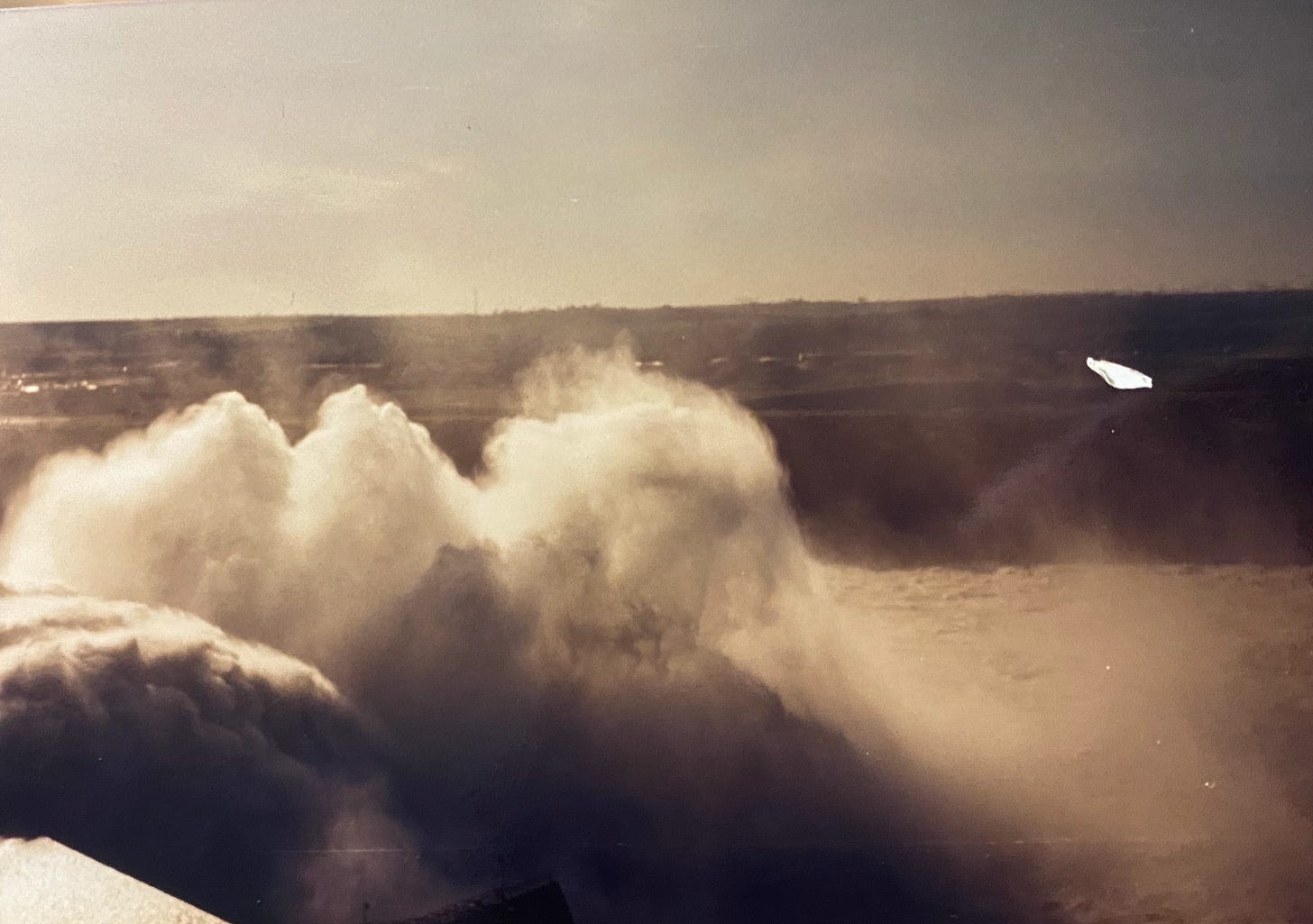I presented an idea to my sister a few nights before her birthday party. “Why don’t we get pictures of you through the years?” She didn’t seem enthused. It didn’t quite go with the party plans, a 1920s-themed party to end off her twenties. We went ahead and decorated our cocktail bar basement like a speakeasy. Baby pictures? Ludicrous.
Then a few days later it came up when my mom found a baby picture of her. It was the funniest picture we’d ever seen, akin to those 80s family photos of a person staring off into the distance while another figure appears in the background. We were all laughing our heads off, and from that moment on, we were sold.
So it was that late in the evening my father emerged with a giant black box. It was a strange box and we didn’t know what to expect when he opened it. Inside was revealed a treasure trove of old family photos, including, to our utter amazement, black and white photos from South America.
I cannot emphasize how rare these are. Until that moment I had a few small pictures or copies of photos from my mom’s country, and to this day only one from my father’s. But suddenly we were assailed with photos of people long gone. For two hours we meticulously went through every single photo, waking from a stupor of history only to realize it was well past eleven and we had work in the early morning.
As I went, I grabbed ones that I thought were particularly interesting. We set aside piles: the ones I liked, the ones we wanted for my sister’s birthday, ones of my cousin, and memories we wanted to know more about. The rest were returned to the box. We soon discovered there were more of these strange black boxes full of photos.
As we went, carefully pouring over photos, my mother shared stories. My mother is a natural storyteller. We have this joke among friends that my mom will suddenly perk up when a song is played and say, “Ooooh, that reminds me of when I was fifteen years old!” She’s a puzzle of odd idiosyncrasies that still fascinate us into our thirties. I’m never sure if this is because she’s a foreigner, or simply because she’s my mother. She’s always existed in a plane that is both as familiar as my bones, and as new as the day.
It’s funny how she appears exactly the same and entirely new in each photo. I discovered photos of my mother experiencing snow for the first time in her life, a phenomenon that brought her to tears. Her sisters were everywhere in the photos, baffling us with how different they looked as teenagers in South America. There was a whole world they carved that we were only barely discovering.
We selected our photos, and they were all we could talk about. We danced around the subject of my abuelita who was found in so many photos. She passed a year ago, and one of my greatest heartache was the lack of memories I had attached to her due to her living in Paraguay. Suddenly, we had all these photos of her throughout her life. We had something tangible.
I grabbed my favorites, brought them to my room, and sifted through them. My mother has a series of photos of Iguazú, the waterfall that was once part of Paraguay until the Triple Alliance War in the 1870s. It’s one of the top places in the world I want to see. I studied each photo, trying to remember how to say the Guarani name I was taught for the waterfalls.
On the drive to work the next day, a drive in which my father, sister, and I carpooled, we discussed the photos. Namely, the joy of physical media. We realized solemnly that this lovely evening of photo searching would be denied to future generations.
“We don’t have these for now. For OUR Lives. Thanks to phones and digital photography we don’t actually have a way to hold pictures of us,” I explained. “I hate that.”
During the pandemic, I went down a rabbit hole of an influencer’s posts. She owned an Airbnb that didn’t interest me save the paintings on display. It turned out the paintings were her grandmother’s, and through digging I discovered following her grandmother’s death the family went through her things and discovered hundreds of paintings. They sifted through them and she chose the ones she loved to decorate her home and properties.
At the time I was primarily a digital artist and had given up photography entirely. On a whim, stuck in the house with family, we decided to do a Bob Ross Night, an idea that filled me with anxiety. My family is a family of artists, but I’m the only one who never went to art school. We proceeded, watching a random episode and all painting. I was the slowest and my family bemoaned my slow speed, then bemoaned the results. It was a beautiful painting. Nothing amazing, sure, but not what you’d expect of someone who never picked up a paintbrush.
The idea of passing on digital files was depressing. I wanted to have something physical like this girl on Instagram. I wanted to own clothes from my ancestors. I wanted their photos, their art, their creations. I wanted to press my face into something they once held and get a whiff of their scent. I wanted proof that they lived, not that they existed. I wanted proof that they laughed and danced and cried and screamed. And I wanted to pass that on. But what do I have to pass on?
Do we stop to scroll through our old Instagram posts? I cannot imagine trying to find old Tumblr accounts to “reminisce” on the past. Our age of social media and instant gratification isn’t designed to reminisce unless reminiscing benefits the algorithm. Our world is designed for NEW NEW NEW. Whether that means fast fashion, churning out new clothes so that trends come and go at a record speed, or new shows on streaming that we’ve been normalized binging in one sitting and then never think about until the next season comes out a year or two later.
Theoretically, the digital age should be perfect for passing on information and memories, but instead, we’ve turned it into a graveyard of posts. I try not to think too heavily on these thoughts, on the way people I knew that have passed still have Facebook accounts with status updates that will one day disappear. Or on the things I did online for years, I cannot begin to find now, and have to accept are lost in a different way from physical things. Yes, in the end, all things will end and be destroyed, but what do I have to show for it now? That’s what weighs me down.
I’m, of course, not alone in this sentiment. There’s a surge of people everywhere wanting more physical media. At work, one of my bosses was explaining his desire to own DVDs of films and TV shows he loves. Gen Z teens are discovering the art of burning CDs and “putting their Spotify playlists” onto a CD that they can keep and even decorate. Yet this week Sony announced it will halt production on Blu-ray films. Physical media is dying a slow agonizing death.
There are, of course, caveats to this. Physical media prices are soaring. My sister and I went to buy disposable film cameras for her birthday and were baffled at the prices. When we asked, everyone shrugged and said, “Yeah they used to be cheap, but they used to be the standard too.” Not to mention the work and time that goes into these things, and time is constantly shrinking.
My sister was musing on the difference between the two of us. I bought disposable cameras that would need to be developed. We had no idea what the pictures would look like, especially as we took photos in a dark karaoke room with flash. We don’t know if we look flattering, or if the lighting is any good. This, to me, is half the charm. My sister, on the other hand, only buys Polaroid film cameras, and she leans towards ones that are part digital cameras so she can see her photo and delete it before it’s printed onto the film. “It just shows how much I prefer instant gratification to you,” she said with a laugh.
It’s also why between the two of us, she prefers art she can finish fast and I prefer slow work. I like to paint, but I’m terribly slow. I enjoy the process of taking my time, taking it one brushstroke at a time. She, on the other hand, is quick and wants quick results. This isn’t a fault on her end, there are many perks, but it highlights a problem overall with trying to obtain more physical media: physical media takes time and time is limited.
So why bother?
I wonder if sometimes we undermine what the power of touch has on us. When we think of touch, the phrase ‘touch starved’ may come to mind, but I don’t mean physical touch. I mean the ability to touch something that is ours. Or, something that once belonged to someone else. To hold a piece of art is one thing, to hold a piece of art that I made with my own hands is something else entirely. To hold something that is well and truly mine is also something else entirely. There’s power in that.
I collect records, and my collection is at about 100 at this point. Nearly all of mine, with minor exceptions, are secondhand. Some have writing on them. One has a faded red pen mark circling each song on a Julie London album that the previous owner must have liked. I’m not going to go on about the sound or get uppity and superior about records here, but there is something incredible about placing down a record and knowing, “I own this. I have this song.” Yes, I don’t own the music in the copyrighted sense, but it’s here. It’s physically in front of me and I can touch it.
A collection of physical media is a collection of our souls. Media, whether that be photographs, vinyl, DVDs, or CDs, is a physical collection of the makeup of our being. Just as the red marks on my Julie London record tell us something about the previous owner. Of course, my focus is more on photos, on the lost art of family photo albums, scrapbooks, and whatnot. I want photos to pass on. I want photos my future family can pour over and rejoice in the way I have.
I wonder how much I’ve been robbed of the digital life that has dug its heels into my life since the creation of Myspace in 2003, which, coincidentally, is around the time we stopped taking photos and developing our film in our family collection.
One obvious consequence is there are no photos dictating my life from 2003 to 2024. There are, yes, but they all exist in computer files, iCloud storage, and a Facebook account I keep deleting and then reviving for my mother’s sake. There is no box I can open and reawaken memories of. Sure, there’s some good to this, but that’s also 21 years of life without any physical documentation.
How do we solve this? In my life, I’m trying to find small ways to fix this. I want to make scrapbooks and organize the photos I have, and I’ve started picking up film cameras. I’m scavenging through records in second-hand shops to hunt for my next surprise find. I’ve got my easel and paints and while I’m ditching Bob Ross, I’m giving painting a real go. And now I carry around a film camera in favor of my iPhone camera. So maybe one day, we’ll have something of our own to look back on.
For now, my home is decorated with the few pictures we have of our own childhood, and each day we come back and marvel. What a thing it is to live in a time where we can freely document our lives. What a waste to shove it all away for an algorithm.












This is so beautifully written and relatable and every time I read a piece like this I'm pumping my fists like YES I NEED TO EMBRACE PHYSICAL MEDIA AGAIN I'M GOING TO DO IT FOR REAL!
I love family photos, and now I too am sad that we won't have this same experience to pass on to the newer generations. When the pandemic started I was freelancing (so basically, unemployed) so I decided to spend 2020 working on a personal project - I scanned all of our family photos. The collection spans over 15,000 images (from scans to digital photos from 2006 on) and so now I have a huge digital collection of those lovely images. Problem is, now I want to do the reverse project: printing my personal photos from 2013 on. I have this grand idea to make photo books for each year, but the problem with digital photography (and being a photographer myself) is that I have thousands of photos that I want to memorialize. Which costs time and money. But every few months I have a moment like this where I remember how important it is to print photos or make something physical or back up your images. Because I do love scrolling back through my Tumblr and Instagram and Facebook, and I do it regularly, but it's so much less satisfying than pulling out our old family scrapbooks that my mom lovingly put together when we were kids.
Thank you for this reminder!!!
I am 100% with you on all of this. There is something so wonderful about holding on to something that was once belonged to someone special to us. (Obviously, more so if they have passed away . . . but even if they are still alive, there is still a sense of connection)
Personally, my little collection of books, notepads, diaries and sketchbooks etc are some of my most treasured possessions (along with a few favourite records / albums too!).
But even more special than that for me, are things like my late father's old taxi license, or the last letter my grandmother wrote to me for my 21st birthday.
Literally, there is not a digital asset in the world that could ever compare with these!
Beautifully written piece, Luka. And so glad to see you back on here again!